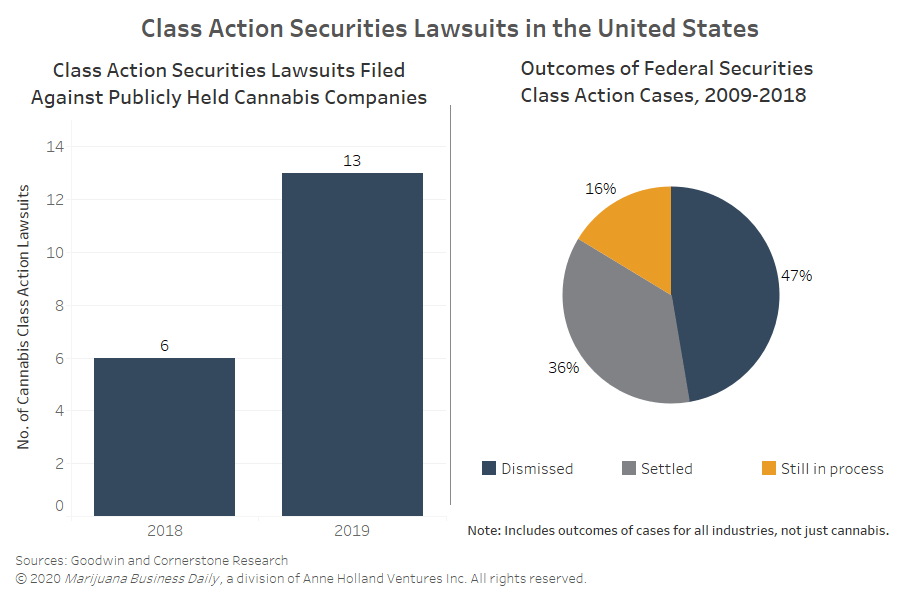Class action lawsuits against cannabis companies are rising, driven by industry growth, stock price volatility, regulatory uncertainties and preventable mistakes by the companies themselves.
The trend shows little sign of abating in the short term, but marijuana companies can reduce their exposure by being more transparent and forthright when disclosing their financials, potential of their products, value of their transactions and other relevant information, legal experts say.
“Plaintiffs’ firms are always out there and monitoring the markets,” said Michael Jones, a partner in the Boston-based Goodwin law firm’s cannabis practice.
When a company’s stock price suddenly drops, he added, “then they take a hard look at what a company said previously, whether they think they can make a case that what the company said was false or materially misleading.”
Lawsuits on the rise
Goodwin recently published a report, “Update on Securities Litigation Against Cannabis Companies,” that detailed 13 class action cases filed against publicly held marijuana and CBD companies in 2019, more than double the six cases filed the previous year.
Most claims against publicly held cannabis companies focus on disclosure issues, specific transactions, financial guidance, financial restatements and internal controls, according to the report.
Jones, the author of the Goodwin report, said he was struck by the number of cases that were seemingly precipitated by short-seller activist shareholders.
Here are examples of a few class action claims filed since December 2018. Companies have denied the allegations.
- December 2018: Claim against Canadian-based Aphria for allegedly making false and misleading statements related to the value of an acquisition in Latin America. The claims were sparked by a short-seller report.
- November 2019: Claims against Canadian-based Aurora Cannabis for allegedly failing to disclose earlier that its revenue for the first quarter of fiscal year 2020 would decline and the company would temporarily halt construction of its facilities.
- December 2019: Suits against Florida-based Trulieve for allegedly making false and misleading financial statements, including overstating the value of its biological assets. The lawsuits were prompted by a short-seller report.
In addition to stockholder lawsuits, consumer class action cases against CBD companies are increasing at a rapid clip because of the influx of capital into the industry, said Jesse Mondry, co-chair of Harris Bricken’s dispute resolution/litigation practice group.
A U.S. Federal Food and Drug Administration warning letter against a CBD company for making an unfounded health claim, for example, “is almost an invitation to a plaintiff’s lawyer,” Mondry said.
Incomplete, inaccurate disclosures increase vulnerability
Stock offerings require companies to disclose risk factors, detailed financials and other relevant information.
But a lot of companies take shortcuts because they are operating on a shoestring budget or lack experienced counsel in securities matters, said California cannabis attorney Khurshid Khoja, founder of Greenbridge Corporate Counsel.
“So there’s plenty of room for missteps, even when one is trying to be aboveboard and transparent,” he said.
It’s not easy, Khoja added, for a company to ask investors for money while at the same time telling them “all the horrible things that could happen to their investment” in their risk disclosures.
In other cases, he added, “some companies didn’t show as much integrity when they were raising money and knew they were taking shortcuts” such as omitting material information.
Careful disclosure can go a long way toward protecting a company.
Jones noted that a New York state court recently dismissed a 2019 class action securities case against Sundial Growers, primarily because the Canadian-based cannabis cultivator had included 35 pages of risk factors in its public stock offering filing. A federal lawsuit is pending.
Cannabis companies also must be cautious after they’ve gone public with their news releases, quarterly earnings calls, regulatory filings and discussions with industry analysts.
“Companies need to make sure that everything is squared away and that their disclosures are accurate and include robust risk disclosures,” Jones said.
Experts advise working closely with internal teams and experienced counsel to ensure public disclosures are accurate.
“You have to be forthright and transparent with investors,” Khoja said.
Communications need to be “thoroughly vetted and checked for accuracy before making statements to the public,” he said, so a company doesn’t overstate or omit relevant information.
There are incentives to do so: Playing by the rules helps cannabis companies keep their licenses, avoids unnecessary legal exposure and keeps investors happy, he said.
Class action primer
The class action process works like this.
Often, a number of law firms file claims, then “duke it out” over the next 90 days to see who will be appointed the lead counsel, Goodwin’s Jones said. Then motions to dismiss and decisions on those motions can run another 12-18 months or so, he added.
If those claims survive, then a class of plaintiffs can be certified by a judge and discovery takes place. For example, the class might be defined as stockholders that owned the company’s stock during a certain period of time. Most claims that proceed that far will be settled at some point.
According to Cornerstone Research, 47% of all federal securities class action claims between 2009 and 2018 have been dismissed, and another 36% settled. Many are pending.
“Very few securities class actions will go to trial,” Jones said, “because the potential damage figures are typically very large and it’s viewed as a significant risk to allow a case to be determined by a judge or jury.”
Spending money upfront on legal advice can save money in the long run, experts said.
The goal is to get a class action claim dismissed at an early stage, Jones said, but even then, the costs can run into the hundreds of thousands of dollars.
“Almost every public company will have insurance that will cover these types of claims,” he said, but the “retention” amount or deductible usually is a million dollars or more. The insurance essentially is there as a backstop for large potential damages or settlement costs.
Experts expect that class action claims are likely to continue to increase in the future because cannabis markets are growing, stock prices are volatile and companies’ public disclosures will be challenged.
“There are still new players coming into the industry, there are still startups raising angel (investor) rounds,” Khoja said.
“And these companies often don’t have enough money budgeted for legal expenses, so unfortunately, I think people will continue to make some of the same mistakes.”
Jeff Smith can be reached at jeffs@mjbizdaily.com







